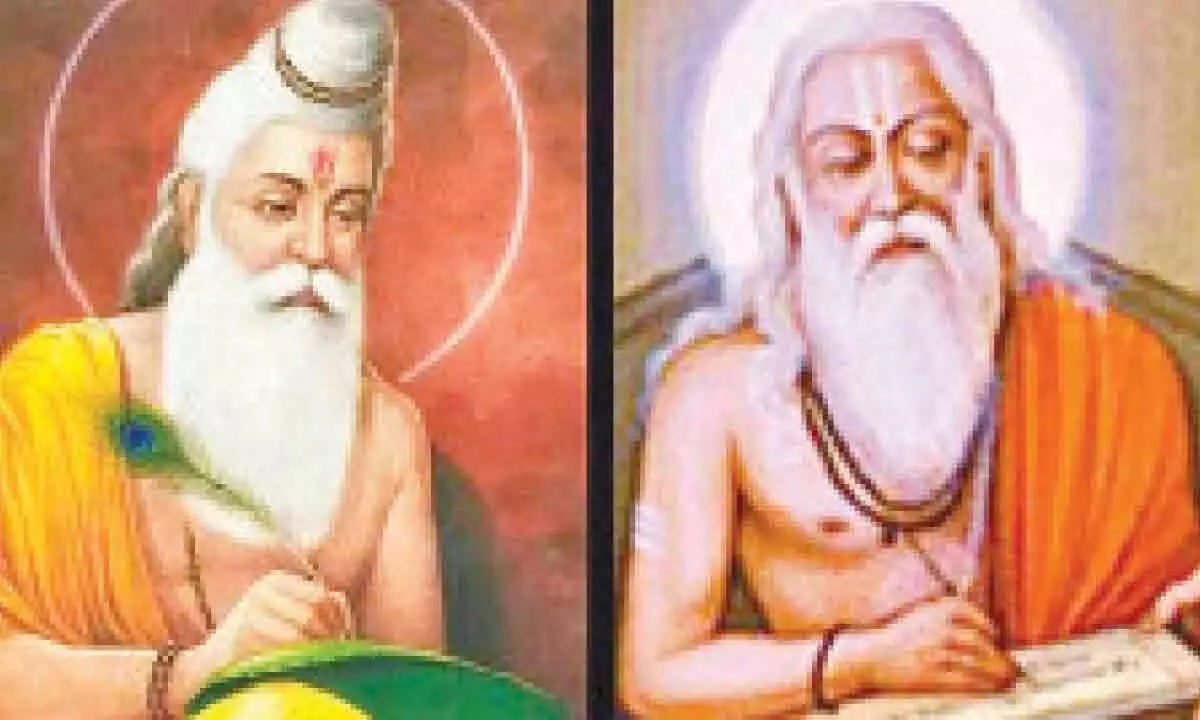Live
- Hyderabad CP CV Anand Issues Stern Warning to Bouncers
- MP Laxman Criticizes Police Conduct, Calls for Support for Victims' Families
- Fire Breaks Out in Kachiguda-Chennai Egmore Express, Passengers Evacuated Safely
- CM Revanth Reddy Condemns Attacks on Film Personalities' Homes, Calls for Strict Action
- Victory Venkatesh and Nandamuri Balakrishna to Set Screens on Fire with Unstoppable Season 4
- Over 71.81 crore Ayushman Bharat Health Account numbers generated: Centre
- In special gesture, Kuwait's Prime Minister sees-off PM Modi at airport after conclusion of historic visit
- Veer crowned PGTI Ranking champion, Shaurya wins emerging player honour
- Sr National Badminton: Unseeded Rounak Chauhan, Adarshini Shri reach singles semis
- Punjab seeks central assistance to strengthen security in areas adjoining Pakistan
Just In

We all take care to hand over our material possessions to our heirs. So do the thinkers, the mentors of society, try to transfer the intangible aspect of a civilization, its culture, to posterity. Such transferred property has a name, ‘sampradaya’. This word, literally, means a precious inheritance. It is generally associated with a religion, and with the worldview of a religion, but it may also transcend the limits of a religion and be more universal in nature
We all take care to hand over our material possessions to our heirs. So do the thinkers, the mentors of society, try to transfer the intangible aspect of a civilization, its culture, to posterity. Such transferred property has a name, ‘sampradaya’. This word, literally, means a precious inheritance. It is generally associated with a religion, and with the worldview of a religion, but it may also transcend the limits of a religion and be more universal in nature.
There are several ways to transfer such culture. In India, great sages, like Vyasa or Valmiki produced great epics which had a grand cultural vision to guide society. They guided the Indian society for thousands of years and produced great rulers and men of character. Supplementing such texts are the great poets, dramatists, composers, singers, the schools of classical dance and sculpture, and several folk traditions. Such works become most revered when associated with some religious tradition. Our country is witness to thousands of such cultural treasures.
The grandeur and elegance of rituals is another component. The recent event in Ayodhya is a great example of beauty and splendour which captivated the nation. Rituals well performed have a lot of elegance in them and quite often, we are charmed by the sublimity and impressiveness. They become an important component of the inherited tradition. We find that dharma is often preserved by such adherence to rituals, following them knowingly or unknowingly. It is hoped that at some time during the adherence of such rituals the persons will come to know their significance.
Preserving our cultural and intellectual heritage is sometimes called conservatism. Conservatism need not necessarily be associated with religion. There can be values which are universal in nature. For instance, the Upanishads did not talk of any religion, but they gave us a concept of an impersonal Reality and through that, a world vision. Similarly, Buddhism and Jainism too had their own idea of Reality and gave a world vision. The philosophical component was different in these, but the ethical component was the same in all Indian philosophical schools. They gave us certain universal values – self-control, truthfulness, non-violence, tolerance, contentment etc., which are not dependent on the orders of God but on our understanding of the oneness of all beings. These core values were adopted in all religious traditions such as Vaishnavism, Shaivism etc., in India.
In modern discourse the word conservatism has pejorative connotations too. There are counter forces which oppose traditional observances and values, calling them retrograde. These counter forces quite often convince people that they are modern, scientific, or progressive. Anything traditional is treated as anti-intellectual also. Adherents to tradition are pushed back as conservative.
But do these counter forces have anything positive to offer? Destroying the past has to be accompanied by something new which can lead to character building. Negation of traditional values seems to be leading to gradual social collapse in the developed countries. The woke culture is the new religion which merely destroys what is conservative. Excessive liberalism and focus on individual liberty and rights have negated the duties of the individual. This new culture demonizes the traditional culture of the land. Social change in urban India seems to be conducive to such forces. Does society not need people with virtues like dedication, self-sacrifice, and truthfulness? Is Rama a better example to be followed for building good human beings or should we follow those who lead us to chaos and normlessness?
(The writer is a former DGP, Andhra Pradesh)

© 2024 Hyderabad Media House Limited/The Hans India. All rights reserved. Powered by hocalwire.com







